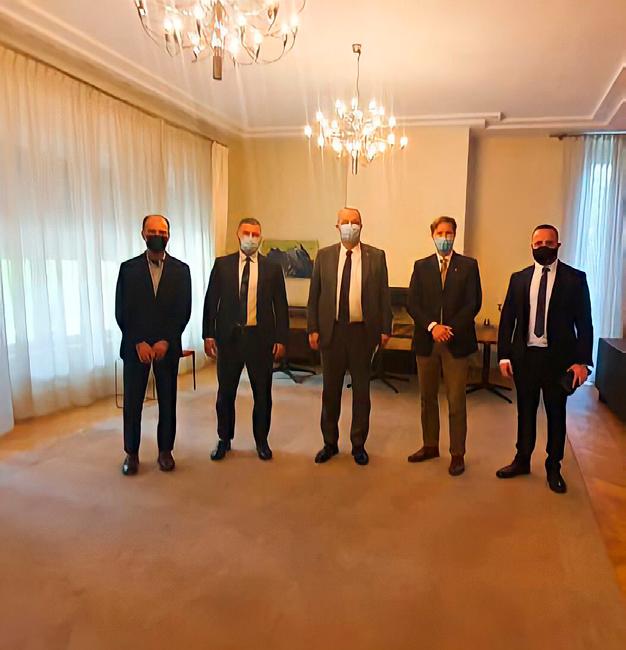
6 minute read
SWISSA Led by “Swissness” Concept
BY RUDINA HOXHA
Executive Director of the Swiss-Albanian Chamber of Commerce (SWISSA), Sokol Cili, talks with TRAILBLAZING MAGAZINE on the Chamber whose establishment came as a need to develop and promote a thriving economic relationship between Switzerland and Albania, as well as to fulfil the ongoing business needs of its members throughout the continuous effort to improve the local economic environment.
Cili underlines that SWISSA has long been missing in Albania for companies of both countries. “We are contacting other chambers in Switzerland to become part of their network, like in Zurich, Geneva, Lausanne, Bern, and Basel, this is one of the main goals of this year,” he stressed. According to Cili, SWISSA is committed to delivering high quality services and building trust through the promotion of Swiss values, know-how and knowledge.
Full interview below:
Can you make a presentation of the Swiss Albanian Chamber of Commerce and what is its mission? improve the local economic environment.
Founded in September 2017, on the 25th anniversary the Embassy of Switzerland hosted a discussion of economic and business links and innovation as a driver for the economy. The new SwissAlbanian Chamber of Commerce was also officially launched.SWISSA founding members are: Trans Adriatic Pipeline (TAP), SGS, SICPA, PWC and SIKA.The mission of the Swiss-Albanian Chamber of Commerce (SWISSA) is to develop and promote a thriving economic relationship between Switzerland and Albania, as well as to solve the ongoing business needs of its members throughout the continuous effort to VISION & MISSION SWISSA was created to fill the lack of communication channels between the business community of Switzerland and Albania. Therefore, the Founding Members, noting the great potential for economic relations between our two countries and the difficulty of exchanging information and identifying business partners, decided to establish SWISSA as an organization that has long been missing in Albania for companies of both our countries. We are contacting other chambers in Switzerland to become part of their network, like in Zurich, Geneva, Lausanne, Bern, and Basel, this is one of the main goals of this year.

How has this Chamber contributed to the development of the trade relations between the two countries?
The stability and prosperity of the Western Balkan countries constitute a fundamental goal of Swiss foreign and security policy. Switzerland’s engagement in the region was initiated in the 1990s, by providing humanitarian assistance and refuge for many people. Between 1992 and 1997, Switzerland’s cooperation with Albania shifted to a full-fledged programme supporting the transition process. Swiss cooperation has always benefited from a trusted partnership with Albania based on mutual interests. The new Swiss Cooperation Strategy 2018-2021 is rooted in the spirit of the agreements of cooperation between the governments of Switzerland and Albania. It represents a strong commitment to continuing support for economic, social and political transition processes in Albania, building on Switzerland’s long-term presence in the country, and earlier achievements. Over the years, Swiss-Albanian cooperation has grown. Today, Switzerland is among the three largest bilateral cooperation partners in the country. Albania has achieved substantial progress in political and macro-economic stability. Switzerland is determined to support the country in addressing the remaining challenges in specific sectors in line with the priorities defined by the Albanian government.

What are the Albanian fields of interest for the Swiss investors and entrepreneurs?
The most common question of the new investitor when they aim to invest in Albania is which are the most profitable sectors in the economy. Albania is implementing important structural reforms that will support equitable growth, raise productivity and competitiveness in the economy, create more jobs, and improve governance and public service delivery. Albania has many of resources that are not or only little developed: a fantastic geographical location, coastal and inland waters, mountain landscapes, natural food, all kinds of natural resources. Albania has the potential to produce enough energy for domestic consumption and export fuels and electric power. Albania’s mineral resources represent an important place because they constitute the raw material base and provide future development prospects for the industry.
The Albanian Government has given a high priority to the investments and the potential foreign investors through liberalization of economic and political framework for attracting them. The sectors of economy considered to be as strategic are: • Agriculture, fishing and forestry • Investment in properties (Real Estate) • Education • Energy and mining • Finance • Health and other socials services • Industry and trade • Information and communications • Public Administration, Law, and Justice • Transportation • Water sanitation and flood protection • Social Protection Agriculture is an important economic sector for the Albanian economy.
Agricultural production concentrates on wheat, corn, oats, potatoes, vegetables, olives, tobacco, fruits, sugar beets, vines, livestock farming and dairy products. The industrial sector is concentrated on food processing, textiles and clothing, construction, oil, cement, chemical products, mining, transport and hydraulic energy. The tourism, telephony, banking and insurance sectors are all booming.
What remain the strengths and the weaknesses of this Chamber and what do you expect to improve in the future?
Swissa has the purpose to create efficient platforms to better serve companies from both countries, a platform of exchange and networking at the service of Swiss-Albanian firms in Albania. The “Swissness” concept represents SWISSA core beliefs about how to conduct activities and it is the foundation of every decisionmaking process. SWISSA is committed to delivering highquality services and building trust through the promotion of Swiss values, know-how and knowledge. “Switzerland is well-known for the traditional Swiss values of democracy, punctuality, efficiency, first class service and precision. Swissness represents, above all, the concepts of naturalness, multiculturalness, fairness, neutrality and the reliability”.
As part of SWISSA compliance culture, we have adopted the “Code of Integrity”. This code sets out the principles and behavior that all SWISSA members and employees must follow, in order to build and maintain an ethical culture and demonstrate integrity in all of our activities, as well as compliance with laws, rules and regulations. 5. Can you mention any forthcoming fair or event where the Albanian-Swiss multicultural and commercial relations will be in the focus? Switzerland and Albania have more than 25 years of cooperation together. During the period 2018 - 2021, Switzerland has cooperated with Albania in four areas: democratic governance, economic development and employment, urban infrastructure and energy, and health. The Swiss support proved to be relevant and contributed to positive changes in the country system aiming to improve living conditions for the Albanian people. Overall, Switzerland has invested approximately CHF 25 Million annually in Albania and this makes Switzerland the second bilateral donor of the country, after Germany.

For the period 2022 – 2025, Switzerland will continue to work in four areas of engagement.
The cooperation budget of Switzerland with Albania, for the period 2022 – 2025 amounts to CHF 105 million. As for the part of the fairs, the situation is a bit unpredictable due to the pandemic and the problems it brings but there will be further organization.

From Left to Right: Sokol Cili, General Director of the Geneva Chamber of Commerce, Industry and Services, Vincent Subilia and the Co-Founder of the Albanian Swiss Chamber of Commerce (ALSWISS), Fatjon Demneri





